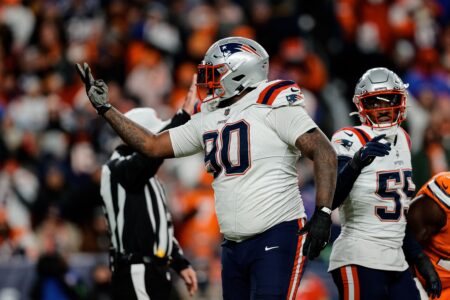Kontradiction
On my retirement tour.
PatsFans.com Supporter
2020 Weekly Picks Winner
2021 Weekly Picks Winner
2023 Weekly Picks Winner
- Joined
- Oct 24, 2006
- Messages
- 68,286
- Reaction score
- 76,690
I’d say it’s a top two effort in the last 19 years. Maybe even #1 overall. However, you’re forgetting that a lot of those other games got out of hand BECAUSE of outstanding defense. I can’t put it above the 2000 Ravens. That team had absolutely no offense whatsoever and yet that game got out of hand because they had picked off the Giants 4 times before the 4th quarter.I think so, given the caliber of opponent, yes. Here are, IMO, the candidates for best defensive performance in a Super Bowl:
SB 3 - Jets 16, Colts 7
SB 18 - Raiders 38, Redskins 9
SB 20 - Bears 46, Patriots 10
SB 35 - Ravens 34, Giants 7
SB 42 - Giants 17, Patriots 14
SB 48 - Seahawks 43, Broncos 8
SB 53 - Patriots 13, Rams 3
Ok so let's break those down.
SB 3: Colts had the #2 scoring, #4 yardage offense in the NFL that year. They averaged 28.7 points a game, so the Jets held them to 21.7 fewer points than average. They allowed 324 total yards to Baltimore that day.
SB 18: Redskins had the #1 scoring, #3 yardage offense in the NFL that year. They averaged 33.8 points a game, so the Raiders held them to 24.8 fewer points than average. They allowed just 283 total yards to Washington that day. But the Raiders blew them out, so it made defense easier as the game went on.
SB 20: Pats had the #10 scoring, #9 yardage offense in the NFL that year. They averaged 25.8 points a game, so the Bears held them to 15.8 fewer points than average. They allowed just 123 total yards to NE in that game, but just as was the case with SB 18, the Bears were up by so much that it made NE one-dimensional, and a bad one at that.
SB 35: Giants had the #15 scoring, #13 yardage offense in the NFL that year. They averaged 20.5 points a game, so the Ravens held them to 13.5 fewer points than average. They allowed just 152 total yards to NY in that game, but see the previous two situations, as the lopsided score made playing defense easier. Also, the Giants' offense was the definition of mediocre that year.
SB 42: Pats had the #1 scoring, #1 yardage offense in the NFL that year. They averaged 36.8 points a game, so the Giants held them to 22.8 fewer points than average. They allowed just 274 total yards to NE in that game. Great performance against maybe the greatest offense the NFL has ever seen. -sigh-
SB 48: Broncos had the #1 scoring, #1 yardage offense in the NFL that year. They averaged 37.9 points a game, so the Seahawks held them to 29.9 fewer points than average. They allowed just 306 total yards to Den in that game. Great performance against an all-time great offense, but the lopsided score made it far easier to play the suddenly one-dimensional Broncos' offense.
SB 53: Rams had the #2 scoring, #2 yardage offense in the NFL that year. They averaged 32.9 points a game, so the Patriots held them to 29.9 fewer points than average. They allowed just 260 total yards to LA in that game. Great performance against one of the great offenses in history, AND the score was so tight all game long that there was absolutely no room for error.
So in SB 53, the Patriots tied the SB 48 Seahawks for the record of holding their opponents to more points under their average than any other team in SB history. Moreover, they held the Rams to fewer total yards than Seattle did Denver. AND the game was much tighter, meaning the defense had no margin for error all game long until the last drive of the game.
So yes, at WORST, it's on the short short list of best defensive performances in SB history, but a strong case can be made that it was numero uno, all things considered.
Edit: While we on that note, look at the Giants’ drives in that game. That’s defensive domination...
Super Bowl XXXV - Baltimore Ravens vs. New York Giants - January 28th, 2001 | Pro-Football-Reference.com

















